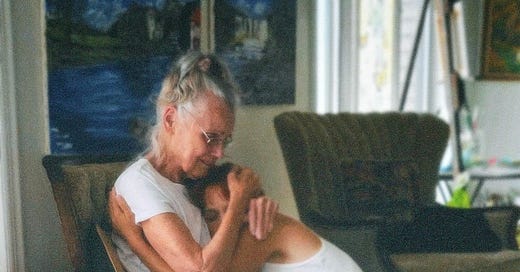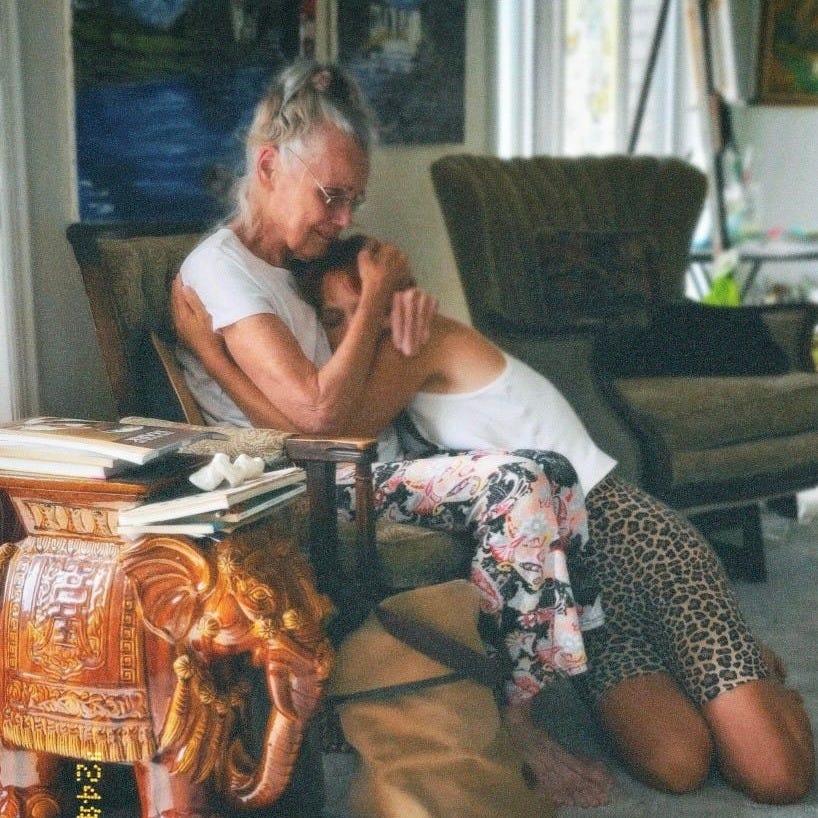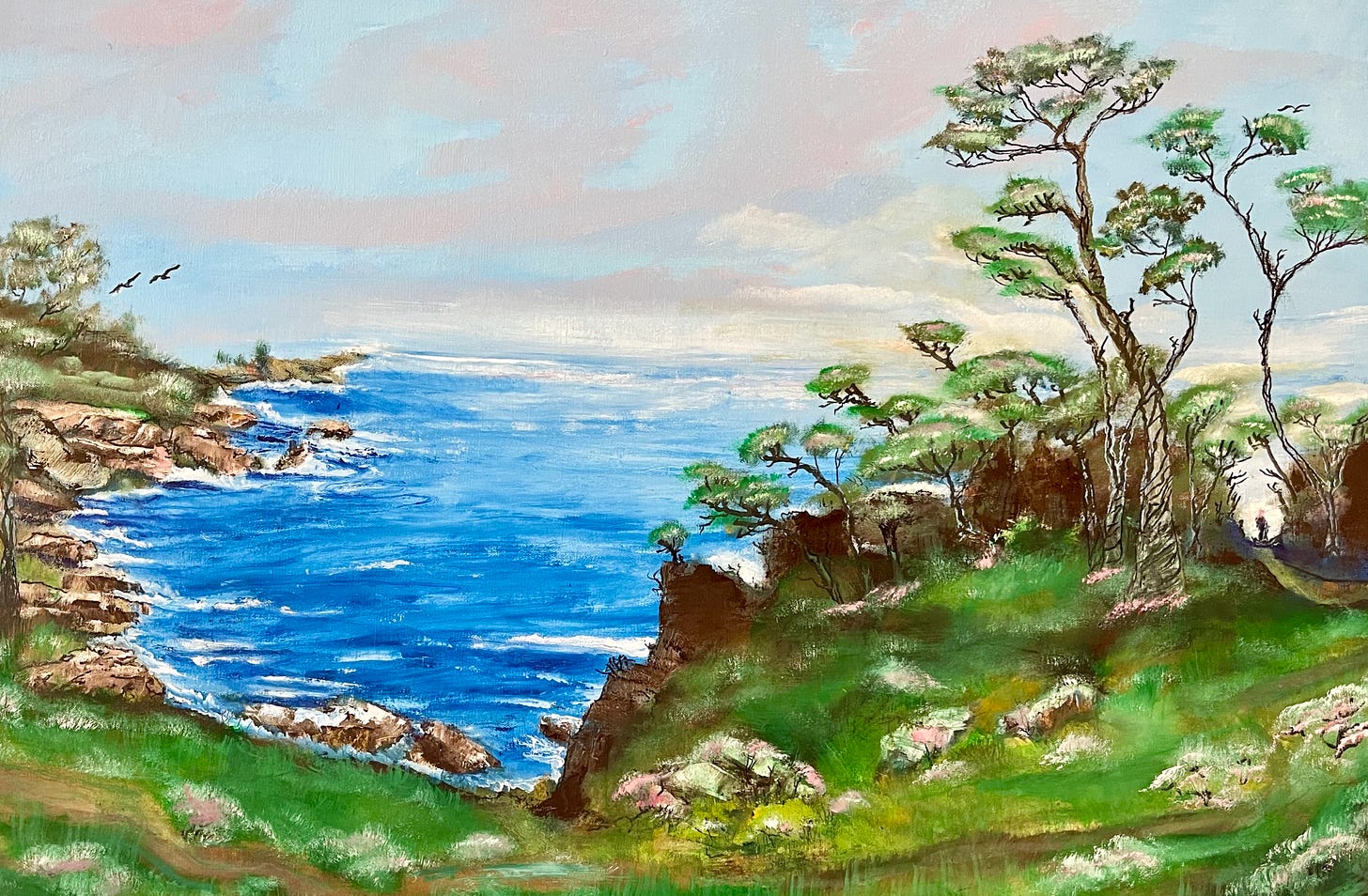June was overflowing with love and grief and can you really have one without the other? It was turning thirty-eight and being celebrated by my friends and family in ways I’d never been before. It was mineral salt pools and starlings on the roof and chopping my hair off. It was fancy country club dinners and sneaking into the hot tub in my black lace evening dress with my naked baby. It was learning how to pivot and pivot again until it felt like a dance with the Universe. It was roadside chicory, tangerine birds, and making a home and a life I don’t want to leave. It was Gregory Alan Isakov in a packed theater in Kentucky and ninety-degree nights to the sound of cicadas. It was releasing my white-knuckled grip and the strawberry moon and seven-hundred-mile road trips. It was sunset swims on Lake Michigan in summer dresses and kissing my son’s sandy face. It was champagne brunches and sunscreen and notebooks filled with wildflowers. It was rocking out to Led Zeppelin in the living room with my son and chocolate-dipped ice cream. It was crying over both of my Grandma’s slipping away from me and realizing I’ve never been any good at goodbyes. It was the Chicago skyline and pop rocks in my mouth and sweaty hugs on the green river. It was taking my son out in the same rowboat I used to go out in on Grandma’s pond and watching his fingers skim the surface. It was lake lighthouses and blue salt water taffy and sunscreen on his cheeks. It was watching the fireflies from bed with my son and holding his tiny hand in the Michigan dark. It was my Levi’s stuffed with flowers picked by my nieces and crying in my Grandma’s shaking arms. It was getting lost in a cornfield, homemade strawberry ice cream, and falling asleep in the sun on the porch. It was rooms full of balloons and walls of blue paintings and seeing that Time is both a thief and a giver. It was carrying my family’s grief and longings and ever-changing moods and not knowing how to put any of it down. Will I ever put it down?
WHAT I’M READING
Fairy Tale by Stephen King
I’ve been reading at least a book a month for the last few years, and this is the first month where I didn’t finish one. Mostly because I’ve been traveling, which means active, present time with my family, and playing with my toddler who is forever trying to understand the new boundaries he finds himself within. I read in the car in the tiny moments I get between here and there, and so far, that’s gotten me a hundred pages into Stephen King’s Fairy Tale. I used to love King when I was in high school but haven’t read one of his books, other than his memoir, On Writing, in years.
My brother gave me Fairy Tale for my birthday. He said, “I know it’s not your genre, but I loved it so read it anyway.” And so I am because when given the chance to connect with the people I love, I take it. I cried through the first fifty pages or so because the themes of an addicted parent hit so close to home for me. Plus, there’s a dog. If there’s a dog in the story, you can be sure I’m going to cry about it. I haven’t hit the whole “fairy tale” part yet, but so far I like the story.
It’s funny reading King as a writer. He can break all the rules, even his own that he outlines in On Writing. Because when you’re as big as him you can do whatever the fuck you want.
I recently took a writing class on how to write tension and stakes in a novel. It was intricate and in-depth and totally exhausting. I think it was meant to put the fun into writing, but for me, it sucked the fun out of it because it feels like a formula, like you have to have A, B, and C, or your book won’t sell. And I’m sure they’re right, but man, it’s hard for me to write like that. I also think that because I came from a chaotic and tumultuous childhood, I’ve spent my whole life trying to downplay things, and dial the drama down, which I guess isn’t good for a writer, and probably why I couldn’t get an agent for my memoir. There wasn’t enough tension, I’m sure. Probably not enough stakes either. I mean, there were stakes, but I probably didn’t write them with enough oomph.
I felt like constantly mentioning the stakes was spoon-feeding the reader, but maybe that’s the point because that’s what King is doing in Fairy Tale. In every chapter, there’s a mention or nod to the stakes and the questions we’re supposed to be asking as the reader, which of course creates tension. I didn’t pose enough questions in the memoir either. I guess I just hoped the reader would come to them on their own, but maybe that’s not how you write books. I worked long and hard on my memoir but actively resisted some of the "Things every story must have" because I just wanted to write what I wanted to write. And I did that, which is what King did for Fairy Tale. Early in the pandemic, he asked himself: “What could you write that would make you happy?” And Fairy Tale was what came out.
I’ll write more about the book when I finish it, and if you’ve read it, I’d love to hear your thoughts in the comments below.
I also spent most of June diving into business books about branding and marketing from a storytelling perspective. I’m trying to get to the center of what we’re trying to convey with our Rhodes Wedding Co. business and bring out the stories that matter. It’s been fun, actually. I’m learning a ton about storytelling from a whole new perspective, and it’s created a buzzing energy around the business that I’ve never experienced in this way before.
WHAT I’M LISTENING TO
Gregory Alan Isakov
If you know me at all, you know that I’m almost always listening to Gregory Alan Isakov. His music has a truly special quality that heals my soul. It's more than just a romantic notion that music heals—it feels like science. His voice is like sound therapy for me, slowing down brain waves and putting my body into a relaxed, dreamlike state. I can physically feel the difference, especially when I watch him live.
I’ve lost count of how many times I’ve seen him perform—across eleven states, maybe more, and even in Spain. Every time it blows my goddamn mind. On our way to Michigan, we stopped in Kentucky where I caught his show in Louisville. I went alone while my husband stayed with our toddler Pressley at the Airbnb. It was a seated show—red velvet seats and all—and I knew there was no way Pressley would sit down through the whole thing. Plus, I needed a distraction-free night to fully take it all in.
It felt good to drive roads I’d never driven in a city I’d never been to alone. I love my family with everything, but man, being alone is a special kind of magic. I drove into downtown Louisville, paid for parking, and went to will call to collect my ticket. Being alone at the will call window, giving my name for the guest list felt so nostalgic. It took me right back to my twenties when I was going to at least three shows a week. Back then, I was a publicist for Atlantic Records and handled all the shows for the label that came through LA. It was quite literally my dream job.
I used to love going to shows alone because I could really focus on the music. Most people, especially people who work in the music industry, talk through shows because they’re desensitized to the music; it being their job and all. But for me, it was like a drug. I lived for it. I let the high carry me to the next show, forever trying to escape the comedown. But it always came, especially after shows I really loved. I still struggle with it. After every Greg show, I’m depressed for a few days and have to reestablish a rhythm to my day. It’s not as intense as when I was young though because now I have a life I love and I’m not using music to escape my reality, which is what I did for the first twenty-five years of my life. Now, I can come home after a beautiful night and kiss my husband and my son and my dogs and see just how special this life is.
Grief and other things
When I planned this trip to Michigan, I scheduled it for a month because I wanted the time to truly immerse myself in moments with my family. I didn't want to rush or feel pressured to cram everything in. For me, it's mostly about finding a natural flow, rhythm, and ease that allows me to be fully present with the people I love.
We stay at my Dad’s place and meet up with my brother and his fam, usually when my Dad is at work. I stay with Dad because there’s more room, but also because it’s hard to connect with him, and I keep hoping if I’m around enough, I’ll catch a moment—something raw and true—that I can hold onto long after he’s gone.
Dad has always been distant, but I've still managed to build a relationship with him, mostly out of desperation and necessity because often he was all I had. I worked like hell to connect with him; I never really gave him any other choice but to love me. Then, at some point in my adult life, I realized that I was the one putting in all the effort, so I stopped trying so hard. At first, we barely spoke for months, and I went through a period of grieving, but for the most part, I've come to accept the way things are. I take the little he has to offer and try not to take his lack of prioritization personally or as a reflection of his love. I try not to let it impact my self-worth because, in reality, his trouble with showing and receiving love stems from his survivor's guilt, which has nothing to do with me. It doesn’t make it any less hard to watch though. It breaks my heart to see the people I love deny themselves the very things they need.
Before coming up here, I had dubbed this summer my “inner child summer,” setting the intention to do all the things I loved to do as a child. You can read all about it in last week’s post along with all the things I had on my list. I’ve checked off quite a few things, but my energy is not anything like my energy when I was a child.
Growing up, I constantly worried about my parents, especially my Mom since she was in prison for most of my childhood. I actually think the worry was probably more for myself, having to navigate the world without her. Mom didn't really need my worry; even in prison, she seemed happy, always laughing, making the most of her situation, seemingly oblivious to how her actions affected those around her, or perhaps just indifferent. I worried about my Dad, too, because I could feel his sadness, even though he tried to hide it, even from himself. I could see it on him, in the way he carried himself and the way his eyes always looked watery and his smile was always pained.
I see it on him now, partly because he works too hard, but mostly because his mother is dying. My grandmother. The woman who helped raise me because my parents were too strung out to do it. She was like a mother to me. Financially stable and dependable. A caretaker, homemaker, teacher, and nurse. An artist. A grower of things—love, families, gardens. Everything I know about the natural world came from her: How to listen for the call of the loon in the morning, the rustle of trembling poplars in the wind, how to prune a grapevine, knead bread, and nurture things much smaller than myself. How to pay attention. Despite losing a son, her husband of fifty years, and just about going to hell and back, she remains the strongest and most graceful person I’ve ever known.
Growing up, she was my safe place.
And now, we’re losing her.
Two years ago, she accidentally rode her mower off a hill on her property. The mower landed on her, breaking a rib which then punctured her lung. The fall seemed to activate the Parkinson's gene she carries—her father had it, and she knew it might come for her someday, but even in her eighties, she hadn’t really shown symptoms. Until the fall. Now, she’s in constant pain and shakes so much she can’t even brush her own hair or open her hands. Her spirit is broken.
She’s always been the one to carry everyone else, and now, she feels she has nothing left to give. I visited her in the last week of June, bracing myself for the worst after Dad warned me that she had been rapidly declining. But can you ever truly prepare yourself to lose the ones you love? To watch them wither and fade away right in front of you? I walked onto the land that felt like Eden to me as a child—a secret garden that felt like a dream. I took the long way up to the house, and when I entered, Grandma hugged me and sobbed. We held each other, her frail body shaking, my voice trembling, and we didn’t let go for a long time.
“I’m sorry I’m such a mess,” she said.
“You’re not a mess,” I said. “You’ve spent your whole life taking care of everyone else. Now it’s your turn to rest.”
She heard me and believed me, but we both knew that resting wasn't in her nature. I tried to smile and talk about easy things like the weather, the poplars, my son, but I found myself crying throughout the day, and even more the next. I couldn’t help thinking, what if this is the last time I see her? Is this what I will remember?
When Parkinson’s began to affect her, she didn’t know how to live with it—how to sleep or eat or paint. Painting has been her lifelong passion, and her work has sold for thousands of dollars. Not being able to paint made her feel restless and lost, so my brother encouraged her, saying, “Paint anyway.” She protested, worried about her shaking hands. He said, “Who cares? Just do it because you love it.” And so, she did.
Now, her new, in-progress paintings hang on the living room walls. “They’re not done,” she said. Yet, they’re breathtaking—fields of blue, blue skies, blue bodies of water. So much blue. Vibrant blue. It’s nothing like her old work, and I loved seeing the shift in tones.
Blue, the color of sadness, the color of longing, but also the color of peace and hope—that’s what I felt when I looked at her paintings. That’s how I will remember her. Not as a mess, but as someone who, despite being lost and in pain, found the strength and joy to do what she loved.
A lesson I will always carry with me. There’s always a way to do the things we love. We just have to find the grit and grace to do it anyway.






Your words always feel like falling into a well. I love the rawness of these letters and thank you for sharing them with us ♥️
I’m so sorry to hear about your grandmother’s decline. My Oma also paints, so I understand what you mean about knowing someone through their art.
Something that helped me on my querying journey was the knowledge that sometimes an agent will pass on a manuscript that’s good because they don’t feel like they can market it at that time. Rejection isn’t necessarily a comment on quality. I don’t know much about the nonfiction world but I assume it’s the same.
I hope your book comes out one day. Wishing you lots of blue-filled moments of peace.